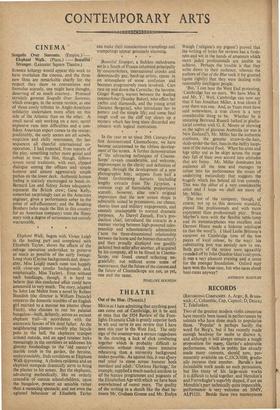CONTEMPORARY ARTS
CINEMA
Seagulls Over Sorrento. (Empire.)Z-- Elephant Walk. (Plaza.) — Beautiful ' Stranger. (Leicester Square Theatre.)
SUMMER lethargy would appear this week to have overtaken the cinema, and the three new films are remarkable chiefly for the respect they show to conventions and formulae scarcely, one might have thought, deserving of so much courtesy.. Protocol certainly governs Seagulls Over Sorrento, which emerges, in the screen version, as one of those costly tributes to Anglo-American solidarity undertaken more often on this side of the Atlantic than on the other. A small naval unit working on a new, secret explosive runs into difficulties and a con- fident American expert comes to the rescue; predictably, the early scenes are all scowls, suspicion and chilly resentment, the last sequences all cheerful international co- operation. I had expected, from reports of the play, something rather more genial and robust in tone; the film, though, follows
scrum naval traditions, with curt, clipped dialogue among the officers and simple humour and almost aggressively simple pathos on the lower deck. Authentic human feeling is scarcely encouraged to break in.
Bernard Lee and Sidney James adequately represent the British crew; Gene Kelly, somewhat surprisingly cast as the American engineer, gives a performance sober to the point of self-effacement; and the Boulting Brothers (who made the film in this country for an American company) treat the flimsy story with a degree of seriousness not entirely warrantable.
Elephant Walk, begun with Vivien Leigh in the leading part and completed with Elizabeth Taylor, shows the effects of the salvage operation undertaken to preserve as much as possible of the early footage. Long shots (Ceylon backgrounds and, detect- ably, Miss Leigh) match none too happily with close-ups (studio backgrounds and, emphatically, Miss Taylor). Even without such handicaps, though, it is hard to believe that this confected affair could have amounted to very much. The story, adapted by John Lee Mahin from a novel by Robert Standish (the director is William Dieterle) concerns the domestic troubles of an English girl married to a morose tea planter (Peter Finch), who chooses to run his palatial bungalow—built, defiantly, across an ancient elephant trail—in accordance with the autocratic fancies of his dead father. As the neighbouring planters rowdily play bicycle polo in the hall, the elephants trumpet around outside, and an aged retainer lurks menacingly in the corridors or addresses his gloomy forebodings to the 'old master's' marble tomb in the garden, the heroine, understandably, finds conditions at Elephant Walk depressing, A cholera epidemic and an elephant stampede drastically serve to bring the planter to his senses. But the elephants, advancing methodically, like an orderly crocodile of outsize school-children, upon the bungalow, present an amiable rather than a menacing spectacle, and not even the agitated behaviour of Elizabeth Taylor
can make their conscientious tramplings and trumpetings appear genuinely alarming.
• ►
Beautifid Stranger, a feckless melodrama set in a South of France inhabited principally by counterfeiters, international crooks and determinedly gay, hard-up artists, opens in an atmosphere of some confusion and becomes progressively more involved. Cars race up and down the Corniche; the heroine, Ginger Rogers, wavers between the leading counterfeiter (Stanley Baker), who offers her yachts and diamonds, and the young artist (Jacques Bergerac), who introduces her to pottery and the simple life; and some final rough stuff on the cliff top clears up a mystery which has long since discarded any concern with logical motivation.
In the year or so since 20th Century-Fox first demonstrated CinemaScope, we have become accustomed to the ribbon develop- ment of the screen. A further demonstration of 'the advancing techniques of Cinema- Scope' reveals considerable, and welcome, improvement in the clarity and definition of images, through the development of a new photographic lens; snippets from half a dozen forthcoming features (including lengthy extracts from The Egyptian, a costume orgy of formidable proportions) scarcely, however, alter one's original impression that the new screen shape is admirably suited to processions, car chases, chorus lines and military engagements, and uneasily unadaptable to normal dramatic purposes. As Darryl Zanuck, Fox's pro- duction chief, introduced the extracts in a manner veering between high-powered sales- manship and schoolmasterly admonition ('note the three-dimensional relationship between the horse and the human characters') and then proudly displayed one gaudily jacketed best-seller after another, all acquired by his company, all to be filmed in Cinema- 'Scope, one found oneself reflecting un- gratefully, not without some sense of reassurance, that the future of the cinema and the future of CinemaScope are not, as yet, one and the same.
PENELOPE HOUSTON


































 Previous page
Previous page